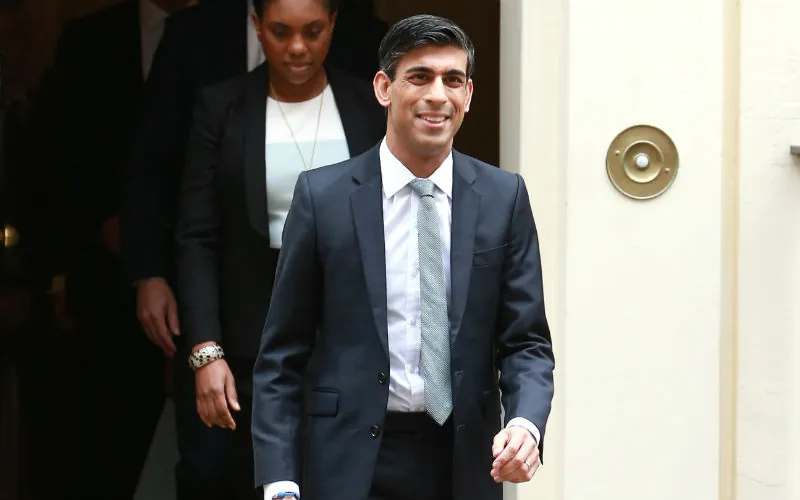Rishi Sunak’s mini-Budget was delivered against the backdrop of war in Ukraine and a growing cost-of-living crisis, with inflation at 6.2% due to rising energy prices and fuel costs.
The Chancellor revealed plans to immediately cut fuel duty, announced a tax reform for research and development, increased the threshold for National Insurance and brought forward two planned business rates reliefs.
Yet in a stark departure from the rhetoric of recent months, there was no mention of ‘levelling up’ the country.
What did the technology sector and wider business community make of the government’s Spring Statement?
Levelling up?
The government has blown the trumpet of its ‘levelling up’ agenda for some time now – but there was no mention of it in today’s statement.
“Inflation is impacting every household across the UK and if anything, the country is being levelled down, rather than up, with inequality continuing to grow,” said Jatin Ondhia, co-founder and CEO of Shojin Property Partners.
“Following the publication of the government’s levelling up whitepaper, why was there no update from the Chancellor on how this important agenda is progressing?”
Jamie Holmes, CEO at VU.CITY, also called for an update on this agenda.
“The cost-of-living crisis and the war in Ukraine have, understandably, meant that ‘levelling up’ and planning reform have slipped down the priority list. However, it’s vital that the Chancellor demonstrates material support for ‘levelling up’ between now and May when the Levelling Up Bill is expected to come into force,” he said.
“Full throated support from all government departments and the industry as a whole will be necessary to drive the Bill’s success and bring to life the change laid out in February’s whitepaper. Now is the time for action rather than rhetoric. The next step will be to properly set out how the government aims to ‘level up’ communities across the country.
“We know that driving digitisation by embracing the latest technology is vital to stimulate investment and development to close the gap between our cities and regions. Investing in tools and upskilling the planning industry with the right technology will be vital to ensure the agenda is a meaningful and long-lasting success.”
R&D tax reform
It was recently announced that £39.8 billion would be made available for research and development as part of the government’s Innovation Strategy. Today tax cuts were announced for R&D, which will also be extended to data science and cloud computing from April 2023.
HM Treasury said this will allow companies to claim for costs related to the storage of vital data, supporting data-heavy research such as genomic sequencing, and also support nascent sectors such as artificial intelligence, quantum computing and robotics, as well as manufacturing and design.
In the Autumn Sunak will decide whether to make R&D credits – a government incentive designed to reward UK companies for investing in innovation – more generous.
“Against a backdrop of global instability and rising inflation at home, the Chancellor’s Spring Statement offers some welcome measures for the UK software sector,” said Civica CEO Wayne Story.
“The decision to extend tax reliefs to all cloud computing costs associated with R&D will ensure the UK can build on its position as a global leader in science and technology. Coupled with this, I strongly welcome the Chancellor’s ‘Innovation Challenge’ to crowdsource ideas for how central government can operate more effectively.
“Digital technologies are already helping to transform public services from Whitehall to city hall, but there is still enormous untapped potential.”
Russ Shaw, founder of Tech London Advocates and Global Tech Advocates, commented: “Although we welcome the pledge to reform R&D tax reliefs, to keep up with rivals like Israel – where R&D spending is closer to 5% – the government must go further than its commitment to increasing total R&D investment to 2.4% of GDP by 2027.
“Here, the private sector, which historically has consistently underdelivered in leveraging R&D investment, must also be ready to step up and play its part.”
Fuel duty
With the price of petrol and diesel continuing to spiral the headline news was that from 6pm today, fuel duty will be cut by 5% until March 2023.
“The Chancellor’s cut on fuel duty and a cash boost for the government’s existing Household Support Fund will help ease the pressure on households during this cost-of-living crisis,” said Stephen Page of SFC Capital.
“However, amid talk of the importance of innovation to economic recovery, he should have gone further in his support for startups, as the ramifications of inflation can be just as damaging for them as for individuals and households. He says he wants to ‘speak to business’ but this is yet to happen in any meaningful way… at least for early-stage businesses that are big drivers of growth.
“Startups are very different beasts these days, the market for investment has changed, and the funding cap of £150,000 for the Seed Enterprise Investment Scheme, set at its launch in 2012, is no longer a viable amount as that spending power has been eroded over the past 10 years.
“It simply does not provide a large enough runway at the early stage. I call on the Chancellor not to wait until the Autumn Budget to take action, and to increase this cap to £250,000 – at least – to offset the impact of inflation and to bring this fantastic scheme up to date.”
National Insurance changes
The government is raising the level at which people start to pay National Insurance contributions by £3,000. The limit will be set at £12,570 from July 2022, which it claims is an annual tax cut worth over £330 for a typical employee.
“The Spring Statement has gone some way to address the concerns of the UK’s 5.6 million SMEs – but recovery for many will be extremely hard to navigate,” said Jonathan Andrew, CEO of Bibby Financial Services.
“It is still the case, that while praised for being the beating heart of the economy, SMEs face being starved of the lifeblood they need to survive.
“In particular, National Insurance increases will come directly from the bottom line, and for many businesses this will be a step too far. And although a cut in fuel prices, and increase to Employment Allowances will provide some relief, this may not go far enough to offset other significant price hikes.
“Our customers, made up of 7,000 SMEs across the UK, tell us they are worried. Worried about going under at a time when we need small businesses to prosper. Amid a global pandemic, an international emergency in Ukraine, Brexit regulations and bureaucracy, SMEs are being forced to make tough decisions to survive.”
Lorna Davidson, CEO of Redwigwam, said: “Like a lot of business owners, I was waiting with bated breath for the Chancellor’s statement. Several of the measures announced demonstrate that he has listened to the concerns of businesses and workers and recognises the additional pressures caused by the Ukraine situation.
“I welcome the announcements regarding the cut in the basic rate of income tax to 19p in the pound and the equalising of the thresholds for National Insurance and income tax.”
Shojin Property Partners’ Ondhia added: “While the future reduction in income tax is welcome, the immediate increase in National Insurance will go ahead. Giveth with one hand and take away with the other! I applaud the help this will provide for lower earners, but this is another classic middle-class squeeze. Compounded with inflation, national wealth will continue to decline.
“Given the backdrop of Ukraine, inflation and growing inequality, now is the time to stimulate the economy through support for small and medium business, which in turn would create more jobs and improve productivity, increasing overall national wealth. Businesses are facing pressures across the board. Rishi could and should have provided further support for business, but we got very little.
“While the Chancellor is in a difficult position fiscally, today’s statement was a missed opportunity to prepare the UK for the tough times ahead.”
Personal allowance income tax
Plans to freeze personal allowance income tax until 2026 were also announced by the Chancellor.
“This will have far-stretching repercussions that the government has simply not considered,” said James Petter, general manager international at Pure Storage. “Freezing tax while income increases will create fiscal drag. What this means is that we will see higher earners being pulled into higher rates of tax while others at the lower end are taxed sooner.
“Unnaturally forcing people into higher rates of tax will cause those individuals to go searching for more income. Add that to the higher rates of national insurance and inflation, and you’ve got a complete package that will end in higher attrition further fuelling the great resignation.
“Combating the great resignation is not just about reducing inflation; the government needs to incentivise businesses to invest in young talent. Companies that incubate young talent not only have lower attrition rates, but they also secure their future. Introducing more apprenticeship schemes is one way to give these youngsters valuable first-hand experience that empowers them with relevant skills and knowledge, but there is so much more that can be done on a much broader scale.”
“The government should be building tech hubs in all the major cities in the UK and investing serious money in rebranding the UK as a supportive environment for tech entrepreneurialism.”
Green technology
The Chancellor said two new business rates reliefs will be brought forward by a year to come into effect in April 2022.
There will be no business rates due on a range of green technology used to decarbonise buildings, including solar panels and batteries, whilst eligible heat networks will also receive 100% relief.
The government says that together, these will save businesses more than £200m over the next five years.


